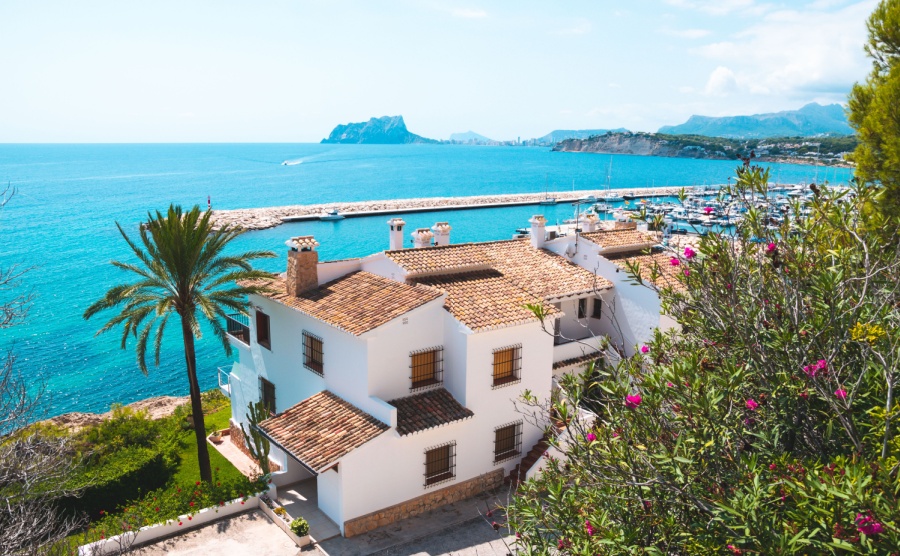You’ve talked about it, dreamed of it, looked at the properties and considered the savings, maybe you’ve even waited for the cat to pop its clogs so you can do it (there’s no need to do that, by the way, cats can retire abroad too!). Now it’s time to retire overseas, but maybe you’ve got cold feet. Here we sift the pros and a few cons too.
Moping around with the post-holiday blues after a glorious summer break? Needless to say, move abroad and you shouldn’t ever have to feel like that again! Here’s our seasonal reminder of the benefits that come with relocating somewhere sunny as a retired expat in 2024.
Want to know the easiest place to retire? Check out our guide here.
More bang for your buck
Average house prices in the UK are now hovering around £281,000 (£302,000 in England, £213,000 in Wales and £523,000 in London). The average semi-detached home in England costs £293,000 or £213,000 in Wales. Convert these to euros and start browsing our portal and you’ll quickly see just how much more comparatively you could get for your money in Continental Europe.
To set the scene, in France’s most affordable areas, particularly central departments such as Vienne and Haute-Vienne, Indre and Indre-et-Loire, average house prices remain below €200,000. But €200,000-€250,000 will be sufficient for a small cottage or village house in most of rural France.

You may get more house for your money overseas (and with a better view)
In Spain, €150,000-€250,000 delivers a good choice of apartments and smaller townhouses near the beach in typical expat spot Orihuela Costa in the Costa Blanca. While away from Italy’s desirable regions – think prime Tuscany, the Lakes etc – its less discovered hilltop villages have some great sub-€100,000 character homes.
As a retiree you’re free to choose your new home based purely on your lifestyle and preferences
Remember too, perhaps for the first time in a long while, as a retiree you’re free to choose your new home based purely on your lifestyle and preferences. Not on proximity to schools, parents(-in-law) or the railway station or length of commute to work… It’s your time to pick and customise your home just as you want it, so enjoy!
Potential downsides?
So, what are the potential downsides to buying property abroad? Some retirees worry that if they move abroad in their 60s but wish to move back in their 80s, two decades out of the UK housing market might mean they can’t afford to. However, this may be worrying unduly as, broadly speaking, UK house prices are generally rising more slowly, if anything, than many European counterparts.
But if still concerned, one answer is to invest some money into an asset that tracks UK house prices – maybe a buy-to-let property here or a real estate investment trust (REIT).
A cheaper retirement overseas
As a retiree on a fixed income, living within your means is simply non-negotiable. So, if you look at those charts for the size of pension pot you need for a comfortable retirement with a mixture of regret and horror, a retirement abroad might be your financial salvation.
Anyway, life gets even more enjoyable when you don’t need to count the pennies all the time. Which should be the case if you’re sensible when you move abroad. Living costs in the UK remain comfortably higher than most popular expat destinations.
According to our own PropertyGuides 2024 index, Spain is the cheapest popular expat destination to live, with typical monthly expenses there £700 cheaper than the UK. Italy, Portugal, Greece, Germany, Ireland, Canada, Cyprus, USA are also comfortably cheaper. France is closer to the UK but still less expensive, by around £145 per month.
Potential downsides?
If your income is in one currency (for example a UK pension) but your expenditure is in another, (euros, perhaps) your retirement income abroad will be subject to fluctuating exchange rates. This makes budgeting difficult. It was a real problem for some retirees after the financial crisis when GBP/EUR weakened by some 10%.
A good solution to this risk is to set up a currency forward contract. This fixes your exchange rate for a year or so. That way you will always know how much you have to spend.
Cut your tax bill?
There’s a strong chance that a move abroad could lead to a lower tax bill. While some countries just have lower taxation generally than the UK, others offer special tax incentive schemes to foreign retirees who move there. As an idea, taxation in Cyprus is considered one of the lowest in Europe. Foreign retirees there have the option of being taxed just 5% on overseas pension income. Similarly, in Greece and parts of southern Italy, expats’ pension income is taxed at a flat 7%.
Also worth considering is what the future holds under the new Labour Government. Could you be affected by their expected tax rises? It might make you consider a move abroad sooner than you first planned. Now could be the perfect time to speak to an overseas tax specialist or financial planning advisor and get an idea of your options.
Potential downsides?
It is essential to get good tax advice when retiring abroad. For example, the 25% of your pension pot you can withdraw tax-free in the UK will not be tax free if you have already moved abroad.
On the other hand, there will be savings. For example, when you retire abroad can have implications. Time it well and there are savings of thousands to be made..
Warmer weather and more sun
Living in Continental Europe or some other tropical destination doesn’t just guarantee long, hot summers. Just as appealing are the balmy temperatures during the rest of the year, especially the milder winters.

New friends in the sun, when you retire overseas
Waking up to blue skies and sunshine all year round not only puts a smile on your face, but it’s good for your body. Known benefits of controlled exposure to sunshine include a boost to the immune system, increased production of Vitamin D, and a lowering of both cholesterol and blood pressure. A change in humidity levels can also relieve health conditions, such as allergies, respiratory conditions, including asthma, arthritis and other joint-related problems.
Potential downsides?
There is always the possibility that you will find it too hot. Temperatures will often hit 40°C in summer in the Mediterranean. There are several ways to deal with this.
The most obvious is to find a cooler destination, but with the same advantages. For example, Tenerife rather than the Costa del Sol, since the islands are cooled by sea breezes. Similarly, Madeira rather than the Algarve. Or the mountains rather than the coast.
There are also easy ways to keep your home cool without always resorting to air-con, especially using shade and breezes cleverly, knowing when to keep a shutter closed and when to throw them open. Plus, of course, proper use of a siesta!
Outside and active
Without even realising it, you’ll be more active living in a warm country. The lifestyle in Europe, especially by the Med, is geared around being outside. Just going about your daily routine gets you up and about. Most expats choose a resort or community within walking distance of the seafront and amenities, from shops and restaurants to social clubs and medical centres. Driving becomes an occasional requirement for day trips or the odd serious shop.

Retirement overseas could be more active and exciting
And for more active types, there are plenty of opportunities to enjoy outdoors activities, such as golf, bowls or tennis, while more leisurely things like bathing in the sea or strolling along the prom become daily routines.
You’ll eat healthier
Get stuck into the local cuisine and chances are you’ll do yourself a world of good. Nowhere is this more applicable than in the Med. A 2023 study by profs at Harvard and Madrid universities showed that embracing the Mediterranean diet and lifestyle together could cut your chances of dying from cancer by 28% and from heart disease by 29%.
This famous diet is based on fresh fruit and vegetables, nuts, beans, cereal grains and fish, with lots of garlic and olive oil thrown into the mix. So it’s bursting with ‘superfoods’ and antioxidants, and low in the wrong types of fat. Dining out at traditional eateries that stick to this cuisine, which typically are geared towards local people as much as expats, is often the cheapest option too!


